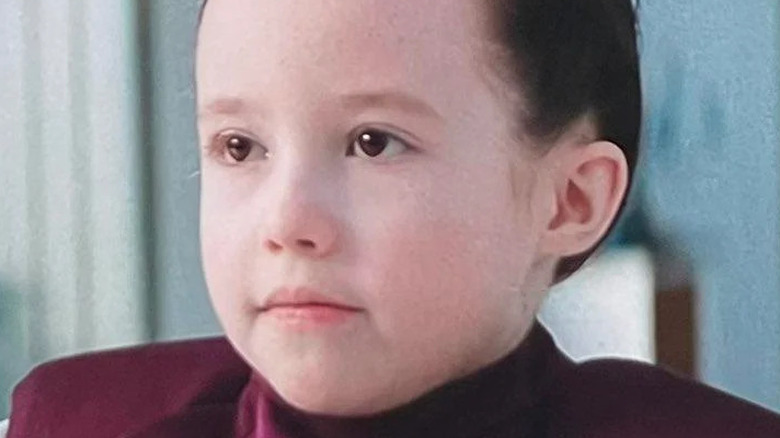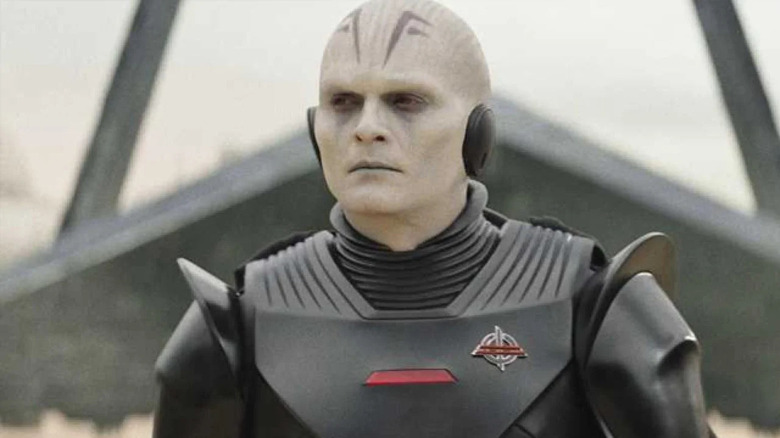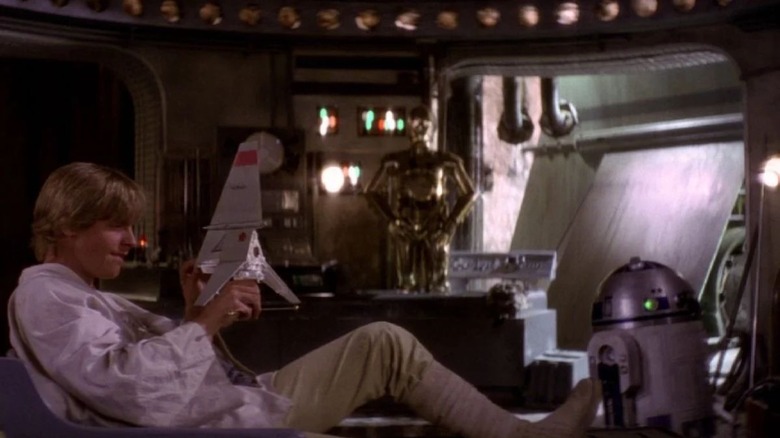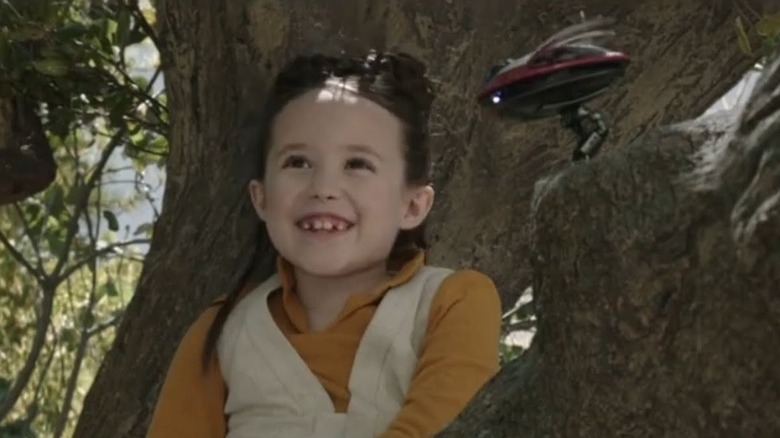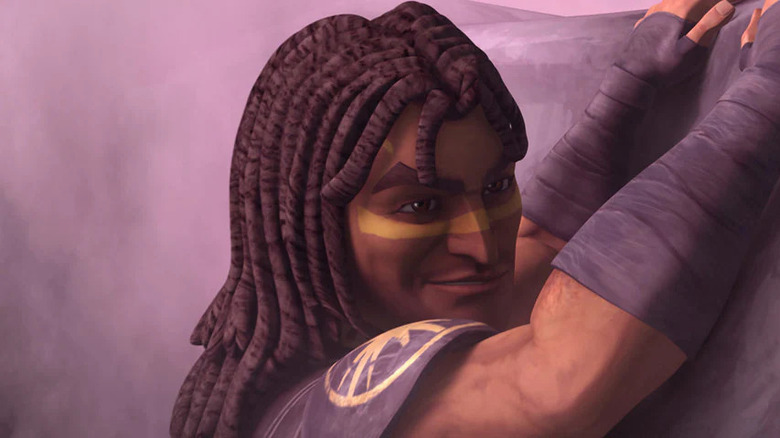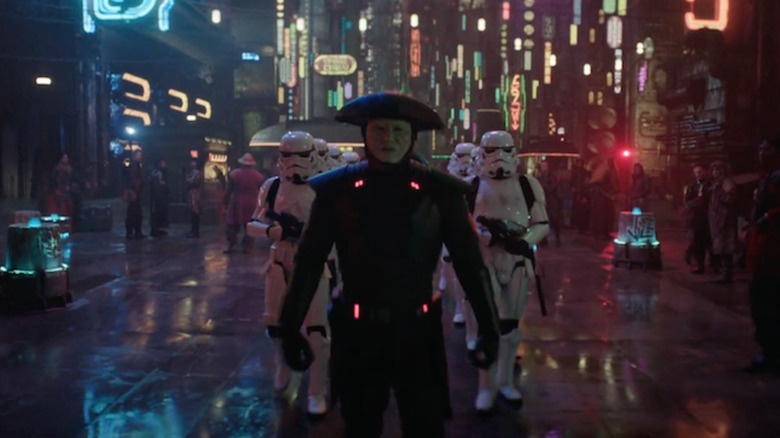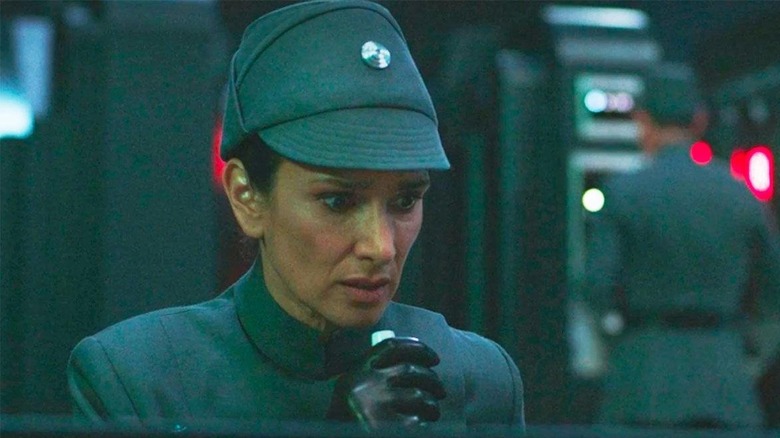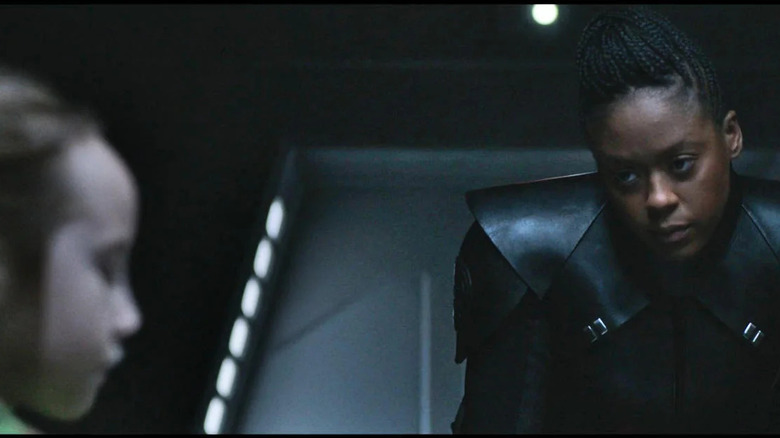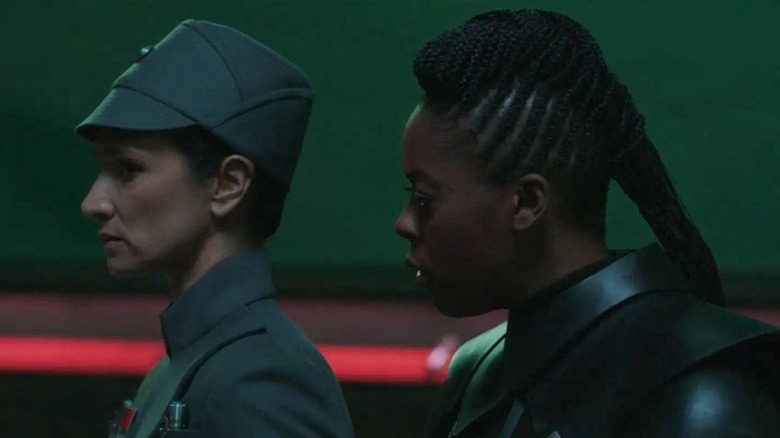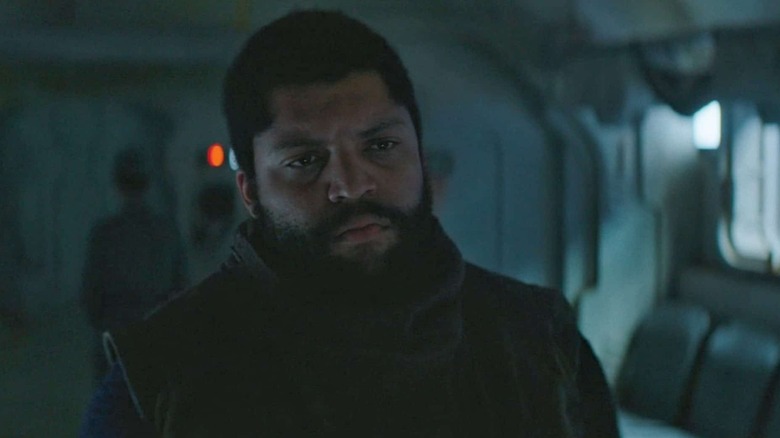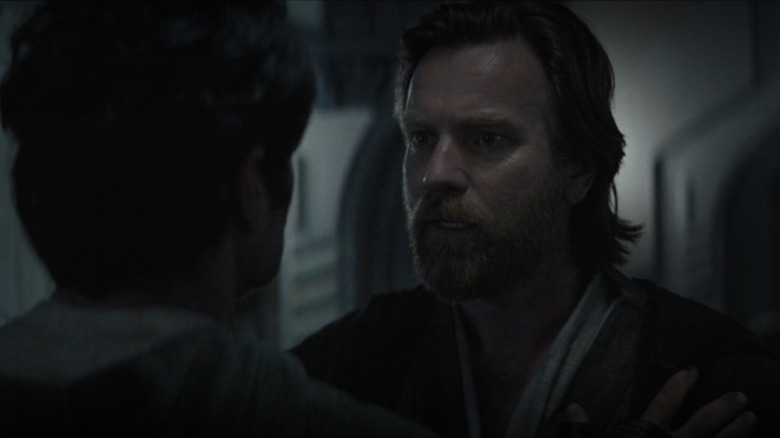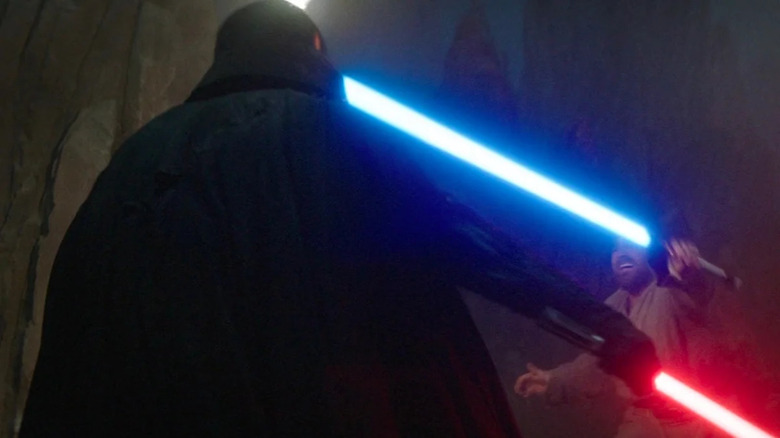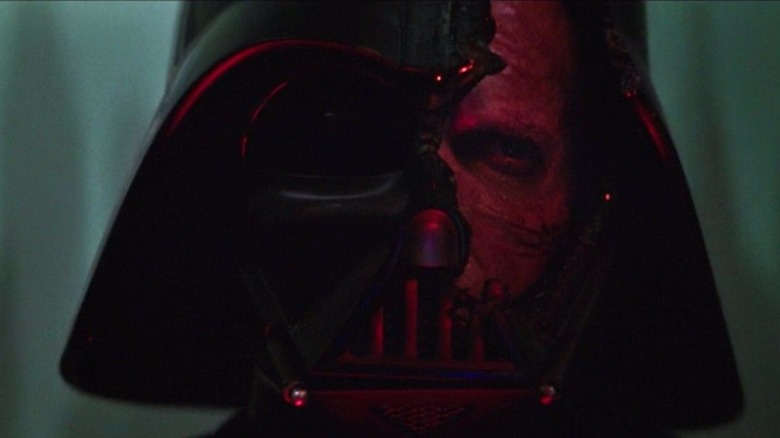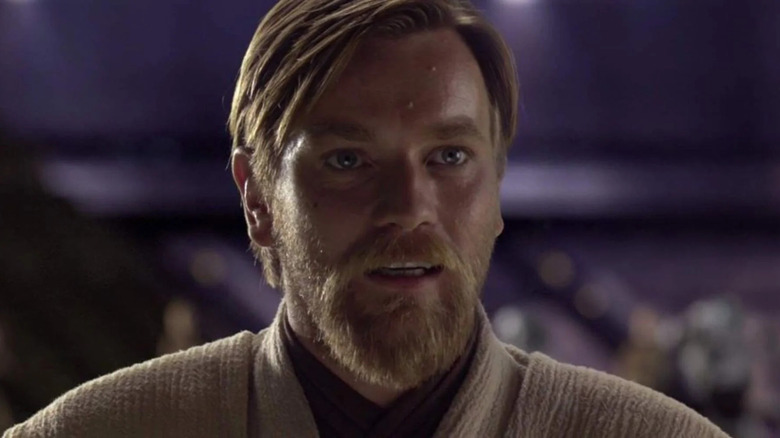Lines In Obi-Wan Kenobi That Mean More Than You Think
The Disney+ limited series "Obi-Wan Kenobi" is chock full of cameos, callbacks, and Easter eggs referencing the larger "Star Wars" universe. The series takes place between "Star Wars: Episode III — Revenge of the Sith" and "Star Wars Episode IV: A New Hope" and references both movies explicitly and implicitly many times over. Additionally, the show's dialogue includes many lines with double meanings and comments characters make that are more revealing than they seem at first.
The story sends Obi-Wan (Ewan McGregor) on a quest to rescue a young Princess Leia (Vivien Lyra Blair) and return her home to the Organa family. Along the way, he encounters opposition from Vader (Hayden Christensen and James Earl Jones) and the Empire's forces, including the conflicted Sith Inquisitor Reva (Moses Ingram). Between all the references and little bits of great characterization, there are a ton of lines in "Obi-Wan Kenobi ” that have a deeper meaning than you might think.
I would say the Jedi hunt themselves
In the opening of "Obi-Wan Kenobi ” we see Lord Vader's Inquisitors tracking down a rogue Jedi on Tatooine. When a bar patron asks their leader, the Grand Inquisitor, if he hunts the Jedi, the Inquisitor retorts, "I would say the Jedi hunt themselves."
Aside from just being a cool-sounding thing for a baddie to say, this sentiment actually gets at the conflict that plagues many of the Jedi in hiding. If they behave like Jedi, they expose themselves to Vader and the Inquisitors, setting themselves and possibly others up for an unpleasant demise in the immediate future. This is specifically how Obi-Wan feels in the first episode. While he understands Leia could be in serious danger, he initially objects to going after her because it would risk exposing his identity. He uses the excuse of watching over Luke, but eventually admits to himself it is his duty to protect both twins. The Jedi code ultimately compels Obi-Wan to do the right thing.
It's just a toy
These two lines "It's just a toy" and "It's much more than that" are exchanged between Owen (Joel Edgerton) and Obi-Wan in the first episode. Obi-Wan is trying to give a toy, a model of a T-16 skyhopper to be specific, to the young Luke, but Owen refuses him. Pleading, Obi-Wan makes the argument that the model ship is "just a toy." In response, Owen tells him that both of them know that this toy has the potential to set off a chain of events that will change Luke's life. We would suggest that Uncle Owen's being a little dramatic ... except we've seen all the "Star Wars" movies and know Uncle Owen is 100% correct to be concerned.
It can be argued that Owen's line hints at the love Luke will eventually develop for ships and flying. Owen might know how much Luke's father Anakin loved to fly and is therefore wary of Obi-Wan giving a model ship to Luke. When he gives it to him at the end of the series, it is implied that Obi-Wan's gift is the reason Luke started down the path of learning to fly. As we see in "A New Hope" (via GamesRadar), Luke is still playing with this toy well into his early adulthood. Clearly, it holds a good deal of sentimental value for him.
The Senate's boring; it's just people in itchy clothes arguing
When her father Senator Bail Organa (Jimmy Smits) tries to talk to Leia about politics, the child immediately shuts him down by calling the Senate "just people in itchy clothes arguing." This line read from Vivien Lyra Blair as a precocious Princess of Alderaan shows a side to the character that can't help but remind us of someone else. The way Leia articulates this sentiment is reminiscent of the feelings Anakin expresses about the Galactic Senate in "Star Wars: Episode II — Attack of the Clones."
This disinterest and childish view of political dealings makes a lot more sense for a 10-year-old Leia than it does for an adult Jedi who is secretly married to a senator. Perhaps this simply speaks to how irrationally Anakin behaves in "Episode II." But regardless, the line shows a bit of Leia's father coming out in her.
Quinlan was here?
One of the best Easter eggs in "Obi-Wan Kenobi" is a reference to a Jedi who has popped up in "Star Wars"-related media for years. When Obi-Wan is scanning the messages inside the safe house on Mapuzo, he discovers evidence that a Jedi he believed lost had been through the safe house recently. In his shock, he asks his guide Tala (Indira Varma) if "Quinlan was here?"
The Jedi Obi-Wan refers to is the rambunctious Quinlan Vos, a Jedi with questionable morals who many "Star Wars" fans have wanted to see on the big screen for years. The mentioning of his name might just be a reference for fan service's sake ... then again, it could also turn out to be more than just a mere Easter egg (via Decider). We didn't end up seeing Quinlan in the second half of this Disney+ series, but perhaps he will make an appearance in the upcoming Cassian Andor show named after the "Rogue One" smuggler.
I will get what I deserve, Third Sister ... and so will you
In Part III of the "Obi-Wan" limited series, we get a rare look at an exchange between the Third Sister and the Fifth Brother (Sung Kang). To some degree, he is the only person Reva can safely express her frustrations to. However, being a follower of the dark side, he can't be especially sympathetic. His retort, "I will get what I deserve, Third Sister ... and so will you," is equal parts sinister and motivational.
It is interesting to go back and revisit this line of dialogue after seeing the ending of "Obi-Wan Kenobi." The show makes out Reva to be a sympathetic character with a redemptive arc. She turns away from the dark side, which reflects the good in her heart. The redemption she ultimately gets is unexpectedly foreshadowed by this conversation. As for what the Fifth Brother gets, he eventually finds himself disemboweled by Darth Maul. Whether or not he deserves that is a matter too complicated and abstract to unpack here. Generally speaking, it seems like a harsh but not altogether unwarranted fate for the merciless Jedi hunter.
Actions speak louder than words
In the third episode of "Obi-Wan Kenobi," imperial spy Tala Durith makes shockingly effective use of an old cliche. The sentiment "actions speak louder than words" is often an empty platitude, but Tala's actions prove that she is a woman of her word and ultimately a brave soldier. In the end, she is a character who sacrifices herself for the greater good.
Many of the heroes of "Star Wars" are chosen by the Force due to their parentage and bloodline. But it is the sacrifices of the common folk of the Galaxy, the ones not destined for greatness, that allow the Rebellion to overthrow the Empire. Tala embodies this side of the Rebellion, even in its earliest stages. She saves Obi-Wan's skin multiple times throughout the series, and in the end, it is Tala's noble sacrifice that allows Bail Organa's hazardous rescue mission to succeed.
The braver you seem, the more afraid you are
When Reva is interrogating Leia after she is captured by the Empire, Reva drops this extremely meaningful line. At first, it seems a little obvious. Already by the age of 10, Leia is the type of person to put on a brave face when she is frightened. Reva knows this is a scary situation for Leia but is also trying to break down Leia's external layer of bravery to unleash the fear within. However, the Inquisitor's words are more revealing than she intends them to be.
In actuality, this line reflects more about Reva than it does Leia. Reva puts on a tough act on the exterior but is ultimately scared of the many phantoms haunting her past. She is scared of failure, but Reva also fears that Darth Vader knows of her true intentions to kill him. As the show continues, we see her eventually tear her walls down and show vulnerability to Obi-Wan in the final episode, sending her life in a whole new direction.
I do like a good liar
This is another fantastic line delivery by Moses Ingram and another line that says more about Reva than the person she is talking to. In this instance, the Third Sister is confronting Tala after having a strong suspicion that the Imperial officer is a spy. As Reva questions Tala, she tests the officer with the statement "I do like a good liar," hinting at the fact that Reva knows Tala is lying. It can even be interpreted as a dig. Reva is calling Tala out for being an unconvincing liar and saying she sees right through her. But the line also works on a completely different, somewhat ironic level.
At this point, Reva believes herself to be a good liar. She thinks she has successfully tricked Dark Vader into believing in her loyalty. In reality, Reva is not the best judge of effective lying. The powerful Sith knows her true intentions of wanting him dead. He can sense her feelings, but he manipulates them to his advantage. In the next episode, Reva finds her chance to attack Vader but experiences a rude awakening that almost kills her.
There are other ways to fight
In Part V of "Obi-Wan Kenobi," Leia, Obi-Wan, and the members of the Path resistance group find themselves trapped inside a facility on Jabiim as Imperial forces begin to close in on their position. As the situation worsens, Obi-Wan makes a difficult decision. He decides to give himself up to Reva, leaving his lightsaber behind. When Roken (O'Shea Jackson Jr.) asks him how he's going to fight without it, the wise Jedi Master says "There are other ways to fight."
Of course, this refers directly to Obi-Wan's plot to use Reva's anger to turn her against Vader. This will buy time the Path needs to orchestrate an escape off the planet. The line also calls back to a Ben Kenobi (Alec Guinness) quote from "A New Hope." When Han (Harrison Ford) and the crew of the Millenium Falcon face the Death Star for the first time, Obi-Wan tells him, "You can't win. But there are alternatives to fighting."
Tell your father I tried
In the explosive finale of "Obi-Wan Kenobi," the Jedi realizes he must confront Vader once and not quite for all. But by doing so, he has to leave Leia on the ship and in the trustworthy-ish hands of Haja (Kumail Nanjiani) and the much more trustworthy hands of Roken. In one of his final words to her before he departs, Owi-Wan asks the young princess to "tell your father I tried."
On the surface, he is obviously talking about Bail Organa. He wants to inspire hope in Leia that she will make it back to her father alive. He didn't quite make it back with her, but he tried his best. As for the deeper meaning, this line definitely also applies to Obi-Wan's feelings about Anakin. He wishes to tell Anakin that he tried to save him all those years ago during the events of "Revenge of the Sith." Even until their final encounter in this episode, Obi-Wan believes Anakin can still be saved.
I will do what I must
This line from the final duel between Obi-Wan and Darth Vader in "Obi-Wan" is a giant direct callback to "Revenge of the Sith." During their duel on Mustafar towards the conclusion to George Lucas' prequel trilogy, "I will do what I must" is a line Obi-Wan delivers before succumbing to his last resort and drawing his lightsaber. "You will try" is the chilling line read by Hayden Christensen as Anakin.
In response to the same exact line in "Obi-Wan," Darth Vader answers in turn by echoing that prior exchange, saying, "Then you will die." The rhyme is a nice touch, but this line is also a callback to a scene during Ahsoka Tano and Vader's legendary duel in "Star Wars: Rebels" (YouTube). Here, Vader's helmet becomes split open, revealing one side of his face. Yes, this is a detail "Obi-Wan Kenobi" borrows from "Rebels." In the final moments of the duel, Ahsoka tries to convince her master to come back to the light, but he refuses and delivers the mighty line, "Then you will die."
Goodbye, Darth
One of the most striking inconsistencies you might notice while watching the original "Star Wars" trilogy is the moment when Obi-Wan Kenobi calls his old apprentice "Darth." In response to Vader's line, "When I left you, I was but the learner. Now I am the master," Obi-Wan tells the ex-Jedi he is "only a master of evil, Darth."
If you saw "Star Wars" in 1977, this would have been a cool line in an amazing confrontation. But in retrospect, it is strange that Obi-Wan calls Anakin "Darth." As the lore about the Jedi and Sith unfolded over the years, it became clear that Darth was a title given to Sith Lords, not a first name. However, we can presume George Lucas and the crew making "Star Wars" weren't thinking that far ahead at the time.
The moment in "Obi-Wan Kenobi” when Obi-Wan defeats Vader and walks away from him, the Jedi's final line to the master of evil is "Goodbye, Darth." This callback retroactively explains why Obi-Wan doesn't call Darth Vader "Anakin" in "A New Hope." By that point, Obi-Wan considers Anakin gone for good; as far as he's concerned, the only thing left of his old friend is a Darth.
Hello there
Whether you loved or hated "Obi-Wan Kenobi," you have to admit that you were waiting for this line the entire time. The delayed gratification is the show's final hit of fan service as Obi-Wan meets a young Luke for the first time. His first words to the boy echo Alec Guinness' opening lines as Ben Kenobi in the original "Star Wars." But more importantly, Ewan McGregor gets to say the line again.
These days, a lot of younger "Star Wars" fans will recognize "Hello there" as a direct reference to the beloved and meme-worthy "Revenge of the Sith." McGregor's delivery of the line after dropping in on General Grievous became one of the many constantly quoted lines from the movie. Now, McGregor gets to bring Obi-Wan Kenobi full circle and deliver the line again, connecting the Obi-Wan Kenobi from the past to the Ben Kenobi we know and love from "A New Hope."
